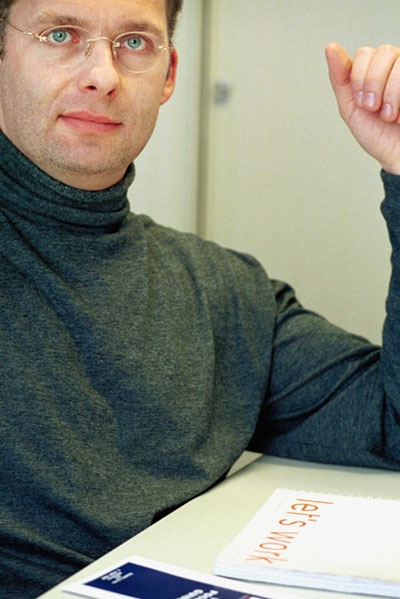Untitled Document
Aware of differences
'What's the story on those other cultures?' A question
he has heard quite often since 'September 11'. Chris Smit, business
consultant at ITIM/Result, gives training in 'intercultural communication'.
On 14 February the second pilot course for the trainee research
assistants of the university's Stan Ackermans Institute (SAI)
is beginning.
 After 'eight years of travel experience'
his suitcase is brimming over with anecdotes. Chris Smit uses
them to clarify the starting points of ITIM (Institute for Training
in Intercultural Management). "I had to go to Hong Kong to
teach a 'time management' course. It was sheer horror! The result
was zip, I talked two days on end with a face as red as a beetroot.
'Time' is very much a culturally defined concept."
After 'eight years of travel experience'
his suitcase is brimming over with anecdotes. Chris Smit uses
them to clarify the starting points of ITIM (Institute for Training
in Intercultural Management). "I had to go to Hong Kong to
teach a 'time management' course. It was sheer horror! The result
was zip, I talked two days on end with a face as red as a beetroot.
'Time' is very much a culturally defined concept."
The psychologist tries to make his students aware of their own
assumptions. He does so on the basis of exercises, role-playing
and discussions. "We don't teach the do's and don'ts of specific
cultures, such as the hand you use to greet people", Smit
explains. "We concern ourselves with the underlying norms
and values of those precepts. The sessions focus more on understanding
than on skills."
All ITIM training courses are based on a model developed in the
1970s by a Dutch anthropologist, Geert Hofstede. According to
the anthropologist members of a certain culture behave according
to the pattern of thought typical of that culture. His model catalogues
societies on the basis of five dimensions, such as the way in
which people deal with differences in power, or the extent to
which they strive for material success. The fact that members
of a culture have a 'high' or 'low score' for the separate
dimensions, can explain a great deal about their behaviour.
The be-all and end-all
"Of course the model is not the be-all and end-all",
Smit emphasises. "It accounts for only part of the differences.
Still, for people with international experience the course is
often an eye-opener." Agnieszka Matysiak, User System Interaction-student
at the SAI, confirms this. In November she took part in the first
pilot course. "The training changed my perception. You assume
that somebody else thinks the way you do, but they don't."
Matysiak felt 'quite lost' in the Netherlands for a long time.
During the course she learnt how differences between the Dutch
and Polish culture contributed to this. "The Poles are rather
a solution-oriented people. They start to tackle a problem straight
away, whereas Dutch people tend to examine the matter much longer.
You also get more freedom to do that here. It had a relaxing effect
on me when I found out that I don't have to come up with the solution
at once. That's only required at the end."
Apart from enthusiasm, there is also criticism of Hofstede's model,
especially from social scientists. They allege that the model
is limited, outdated and particularly 'ethnocentric', as it was
developed in a western culture. "Naturally the theories of
a society are an extract of that culture itself", Smit concurs.
"Yet the model is based on large-scale statistic research.
The proof of the pudding is still in the eating: if someone recognises
the handles I supply, that is a good enough test for me. After
all, the model is just a means, not an end in itself."
Since the events of September 11 the consultant has seen increasing
interest from companies in the courses. "They come to me
and ask, 'what's the story on those other cultures?'. Globalisation
appears to be primarily a technological phenomenon: managers easily
cross the border with their mobile phones, e-mail and internet.
But there is a human aspect to be reckoned with as well, namely
that other culture."
Unfamiliarity
Unfamiliarity with other cultures plays tricks on many managers,
says Smit. "For instance, I had a student who had made a
spreadsheet in Excell. Colleagues from the establishments in France
and Belgium had to work with them. He failed to understand why
they didn't." During the course the man discovered that the
management style in France and Belgium differs from that in Holland.
"The contact with one's superior and inspections are far
more important there", says Smit. "However, he expected
them to do what he wanted, if he just left them to their own devices."
The ITIM training courses do not provide cut-and-dried solutions
to such problems, though. "People have to write down their
'cultural issues' and find solutions for those themselves",
Smit explains. The consultant is sparing of his own opinion, especially
when politically controversial matters are at issue. "The
ITIM refrains from political statements. Which is not always easy,
given the situation in the world. People ask my opinion about
all sorts of things: what's your view on Afghanistan? All I can
do is make an analysis, and then pose the question once again
to the people themselves. You need to be very cautious with that."/.
Chris Smit. Photo: Bart van Overbeeke







